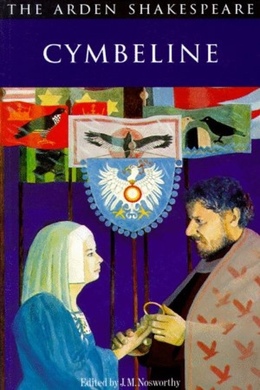
-
EPUB 214 KB
-
Kindle 250 KB
-
Support epubBooks by making a small $2.99 PayPal donation purchase.
Description
The King of Britain, enraged by his daughter’s disobedience in marrying against his wishes, banishes his new son-in-law. Having fled to Rome, the exiled husband makes a foolish wager with a villain he encounters there - gambling on the fidelity of his abandoned wife. Combining courtly menace and horror, comedy and melodrama, Cymbeline is a moving depiction of two young lovers driven apart by deceit and self-doubt.
114 pages with a reading time of ~1.75 hours (28706 words), and first published in 1609. This DRM-Free edition published by epubBooks, 2016.
Community Reviews
There are currently no other reviews for this book.
Excerpt
Britain. The garden of Cymbeline’s palace.
[Enter two Gentlemen]
First Gentleman
You do not meet a man but frowns: our bloods No more obey the heavens than our courtiers Still seem as does the king.
Second Gentleman
But what’s the matter?
First Gentleman
His daughter, and the heir of’s kingdom, whom He purposed to his wife’s sole son–a widow That late he married–hath referr’d herself Unto a poor but worthy gentleman: she’s wedded; Her husband banish’d; she imprison’d: all Is outward sorrow; though I think the king Be touch’d at very heart.
Second Gentleman
None but the king?
First Gentleman
He that hath lost her too; so is the queen, That most desired the match; but not a courtier, Although they wear their faces to the bent Of the king’s look’s, hath a heart that is not Glad at the thing they scowl at.
Second Gentleman
And why so?
First Gentleman
He that hath miss’d the princess is a thing Too bad for bad report: and he that hath her– I mean, that married her, alack, good man! And therefore banish’d–is a creature such As, to seek through the regions of the earth For one his like, there would be something failing In him that should compare. I do not think So fair an outward and such stuff within Endows a man but he.
Second Gentleman
You speak him far.
First Gentleman
I do extend him, sir, within himself, Crush him together rather than unfold His measure duly.
Second Gentleman
What's his name and birth?
First Gentleman
I cannot delve him to the root: his father Was call’d Sicilius, who did join his honour Against the Romans with Cassibelan, But had his titles by Tenantius whom He served with glory and admired success, So gain’d the sur-addition Leonatus; And had, besides this gentleman in question, Two other sons, who in the wars o’ the time Died with their swords in hand; for which their father, Then old and fond of issue, took such sorrow That he quit being, and his gentle lady, Big of this gentleman our theme, deceased As he was born. The king he takes the babe To his protection, calls him Posthumus Leonatus, Breeds him and makes him of his bed-chamber, Puts to him all the learnings that his time Could make him the receiver of; which he took, As we do air, fast as ‘twas minister’d, And in’s spring became a harvest, lived in court– Which rare it is to do–most praised, most loved, A sample to the youngest, to the more mature A glass that feated them, and to the graver A child that guided dotards; to his mistress, For whom he now is banish’d, her own price Proclaims how she esteem’d him and his virtue; By her election may be truly read What kind of man he is.
Second Gentleman
I honour him Even out of your report. But, pray you, tell me, Is she sole child to the king?
First Gentleman
His only child. He had two sons: if this be worth your hearing, Mark it: the eldest of them at three years old, I’ the swathing-clothes the other, from their nursery Were stol’n, and to this hour no guess in knowledge Which way they went.
Second Gentleman
How long is this ago?
First Gentleman
Some twenty years.
Second Gentleman
That a king’s children should be so convey’d, So slackly guarded, and the search so slow, That could not trace them!
First Gentleman
Howsoe’er ‘tis strange, Or that the negligence may well be laugh’d at, Yet is it true, sir.
Second Gentleman
I do well believe you.
First Gentleman
We must forbear: here comes the gentleman, The queen, and princess.
[Exeunt]
[Enter the QUEEN, POSTHUMUS LEONATUS, and IMOGEN]
QUEEN
No, be assured you shall not find me, daughter, After the slander of most stepmothers, Evil-eyed unto you: you’re my prisoner, but Your gaoler shall deliver you the keys That lock up your restraint. For you, Posthumus, So soon as I can win the offended king, I will be known your advocate: marry, yet The fire of rage is in him, and ‘twere good You lean’d unto his sentence with what patience Your wisdom may inform you.
POSTHUMUS LEONATUS
Please your highness, I will from hence to-day.
QUEEN
You know the peril. I’ll fetch a turn about the garden, pitying The pangs of barr’d affections, though the king Hath charged you should not speak together.
[Exit]
